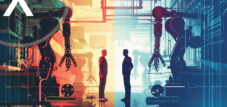The development of new AI models is undoubtedly a crucial factor for the future of artificial intelligence (AI)
Language selection 📢
Published on: September 4th, 2024 / Update from: September 4th, 2024 - Author: Konrad Wolfenstein

The development of new AI models is undoubtedly a decisive factor for the future of artificial intelligence (AI) - Image: Xpert.Digital
🌟 The importance of developing new AI models
🤖 The need for new AI models: Continuous improvement for higher productivity
Developing new AI models is crucial as the demands on artificial intelligence continue to increase in the modern world. Companies and organizations worldwide are using AI to optimize their work processes, increase efficiency and increase their productivity. In industry, AI enables the automation of production processes, real-time monitoring of machines and predictive maintenance. Such progress is unthinkable without constant improvements in model development.
Suitable for:
🔬 The influence on science
In science, artificial intelligence enables completely new approaches to data analysis and modeling of complex systems. The decoding of genetic codes is made easier by machine learning, leading to faster advances in medicine and biotechnology. Scientists use AI to perform simulations that would be unthinkable using traditional methods and to analyze vast amounts of data that would otherwise take years to evaluate.
An important aspect here is the further development of neural networks, which form the basis of many modern AI models. These networks, inspired by the way the human brain works, enable machines to recognize patterns, make predictions and make decisions that in many cases can resemble or even exceed those of a human expert.
⚖️ Challenges and ethical considerations
However, the further development of AI models also brings with it challenges that cannot be neglected. A central problem is the question of the transparency and explanability of AI decisions. Many of the most advanced AI models, especially deep neural networks, act as “black boxes”, the internal functionality of which is difficult to understand not only for outsiders, but also difficult to understand for experts. This leads to consideration in terms of responsibility, especially if AI is used in critical areas such as medicine or case law.
In addition, AI models raise ethical questions, particularly with regard to the potential for bias and discrimination in the results. It is crucial that AI model developers ensure that their systems are free of bias and do not discriminate against disadvantaged groups. This requires rigorous testing procedures and ongoing monitoring of AI models in real-world use.
📊 The role of data
Another key aspect when developing new AI models is the availability and quality of data. AI models rely on processing large amounts of data to recognize patterns and make predictions. The larger and more diverse the data set, the more powerful the AI model can become. However, it must be ensured that the data is representative and of high quality, otherwise distortions can arise that negatively influence the results of the model.
🤖 AI in Industry 4.0
A current example of the influence of AI models is Industry 4.0, the fourth industrial revolution characterized by the use of artificial intelligence and automation. In this new era, people and machines are working more closely together than ever before. Robots controlled by AI systems not only take on physically demanding work, but also increasingly tasks that require cognitive skills, such as quality control or process optimization.
Developing AI models capable of handling such complex tasks is crucial to the competitiveness of companies. In a global market characterized by rapid technological progress and increasing demands, companies that successfully implement AI can gain a significant competitive advantage.
Suitable for:
🔮 Further development of AI models
It is undeniable that the future of artificial intelligence lies in the further development of AI models. The better these models get, the more we will benefit from automation and the possibilities of AI. But the path there is not without obstacles. Ethical considerations, legal frameworks and ensuring fair use of this technology are just some of the challenges that need to be overcome.
In summary, the development of new AI models is a crucial feature for the future of artificial intelligence. It is the engine that drives innovation in a wide range of industries and gives us the opportunity to overcome challenges in completely new ways. But careful planning and monitoring is needed to ensure that these developments are used for the good of society and do not lead to new injustices.
Suitable for:
📣 Similar topics
- 📊 The importance of new AI models for industry
- 🔬 Scientific advances through AI developments
- 🚀 How AI is transforming Industry 4.0
- 📉 Challenges in explaining AI decisions
- 🧬 Artificial intelligence in medicine and biotechnology
- 🛠 AI-supported automation in modern production
- 🔍 Ethical concerns when developing AI models
- 📃 The impact of high-quality data on AI
- 🤖 The role of neural networks in modern AI systems
- 🌍 The future of artificial intelligence and its challenges
#️⃣ Hashtags: #ArtificialIntelligence #Science #Ethics #Industry40 #Automation
Our recommendation: 🌍 Limitless reach 🔗 Networked 🌐 Multilingual 💪 Strong sales: 💡 Authentic with strategy 🚀 Innovation meets 🧠 Intuition
At a time when a company's digital presence determines its success, the challenge is how to make this presence authentic, individual and far-reaching. Xpert.Digital offers an innovative solution that positions itself as an intersection between an industry hub, a blog and a brand ambassador. It combines the advantages of communication and sales channels in a single platform and enables publication in 18 different languages. The cooperation with partner portals and the possibility of publishing articles on Google News and a press distribution list with around 8,000 journalists and readers maximize the reach and visibility of the content. This represents an essential factor in external sales & marketing (SMarketing).
More about it here:
🌟📊🌟 The diverse requirements for AI models in different industries
🌍✨ In business, there are different requirements for AI models depending on the industry and area of application. Therefore, a single AI model can rarely cover all needs. Different AI models are often developed for different industries in order to optimally meet specific challenges and requirements. However, there are also generic AI models that are applicable in different industries, but typically require customization or fine-tuning.
Here are some examples of how AI is used in different industries and how the models may differ:
💸 Financial industry
Fraud detection
This uses specialized AI models that analyze large amounts of data in real time to identify fraudulent activities.
Risk assessment
Financial institutions use AI to analyze credit risk and investments by processing large amounts of historical and current data.
⚕️ Healthcare
Diagnostics
AI models that use image recognition help diagnose diseases (e.g. by detecting tumors in MRI or CT scans).
Personalized medicine
Models analyze genetic data to develop individualized treatment plans.
🛒 Trade and e-commerce
Recommendation systems
Models that analyze customer behavior to provide personalized product recommendations.
Inventory optimization
AI helps optimize supply chains and inventory in real time to reduce costs and minimize delivery times.
🏭 Production and manufacturing
Predictive maintenance
AI is used to analyze machine data and predict maintenance needs before failures occur.
Automation of production processes
Models optimize production processes and increase efficiency.
📈 Marketing
Customer segmentation
AI can analyze large amounts of customer data to develop targeted marketing strategies.
Sentiment analysis
Models analyze social media and other data sources to understand consumers' opinions about a brand or product.
🚚 Logistics
Route optimization
AI helps to optimize transport and delivery routes to save costs and time.
Warehouse management
Models monitor and control warehouse processes to maximize efficiency and accuracy.
🤖🔍❌ No “unit size” for AI models: tailor-made solutions for specific industry requirements
There is no “unit size” for AI models that are equally suitable for all industries and applications. Instead, tailor -made models often have to be developed that are tailored to the specific requirements of an industry or even a specific company. However, underlying technologies, such as machine learning or neural networks, can be used as the basis for many different applications. These models must then be adapted and specialized in order to be successful in various industries.
📣 Similar topics
- 🔍 Tailored AI models for every industry
- 🧠 No one size fits all: Customized AI for specific applications
- 🏢 Industry-adapted AI for maximum efficiency
- 🤖 Individual AI models for company needs
- ⚙️ Adaptation of AI: success factor in various industries
- 🌐 Basic technologies as a basis for specialized applications
- 🔧 Specialized AI developments for various economic sectors
- 💼 Customization of AI solutions for industry-specific challenges
- 🧑💼 Personalized AI models for business needs
- 💡 Leverage technologies: Adapted AI for different industries
#️⃣ Hashtags: #ArtificialIntelligence #IndustrySolutions #TailoredSolutions #TechnologyAdaptation #SpecializedModels
We are there for you - advice - planning - implementation - project management
☑️ SME support in strategy, consulting, planning and implementation
☑️ Creation or realignment of the digital strategy and digitalization
☑️ Expansion and optimization of international sales processes
☑️ Global & Digital B2B trading platforms
☑️ Pioneer Business Development
I would be happy to serve as your personal advisor.
You can contact me by filling out the contact form below or simply call me on +49 89 89 674 804 (Munich) .
I'm looking forward to our joint project.
Xpert.Digital - Konrad Wolfenstein
Xpert.Digital is a hub for industry with a focus on digitalization, mechanical engineering, logistics/intralogistics and photovoltaics.
With our 360° business development solution, we support well-known companies from new business to after sales.
Market intelligence, smarketing, marketing automation, content development, PR, mail campaigns, personalized social media and lead nurturing are part of our digital tools.
You can find out more at: www.xpert.digital - www.xpert.solar - www.xpert.plus
























